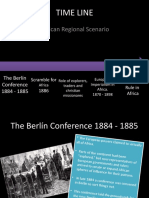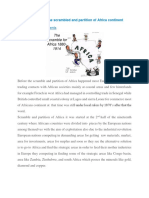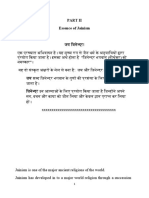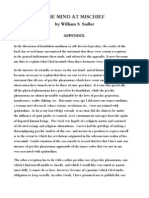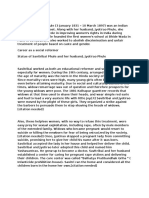0 ratings0% found this document useful (0 votes)
112 viewsCH 25.3 The Scramble For Africa
CH 25.3 The Scramble For Africa
Uploaded by
sohailsarwarIn the late 19th century, European powers rapidly colonized Africa in a period known as the "Scramble for Africa". Driven by new economic, political, and cultural motives, Europeans competed for territory in Africa and divided the continent among themselves by 1914. However, Africans resisted European rule through military resistance, like the Zulu victory over the British at Islandlwana and Ethiopia's defeat of Italy at Adwa, preserving some independence.
Copyright:
© All Rights Reserved
Available Formats
Download as PDF, TXT or read online from Scribd
CH 25.3 The Scramble For Africa
CH 25.3 The Scramble For Africa
Uploaded by
sohailsarwar0 ratings0% found this document useful (0 votes)
112 views16 pagesIn the late 19th century, European powers rapidly colonized Africa in a period known as the "Scramble for Africa". Driven by new economic, political, and cultural motives, Europeans competed for territory in Africa and divided the continent among themselves by 1914. However, Africans resisted European rule through military resistance, like the Zulu victory over the British at Islandlwana and Ethiopia's defeat of Italy at Adwa, preserving some independence.
Original Description:
British History
Original Title
Ch 25.3 the Scramble for Africa
Copyright
© © All Rights Reserved
Available Formats
PDF, TXT or read online from Scribd
Share this document
Did you find this document useful?
Is this content inappropriate?
In the late 19th century, European powers rapidly colonized Africa in a period known as the "Scramble for Africa". Driven by new economic, political, and cultural motives, Europeans competed for territory in Africa and divided the continent among themselves by 1914. However, Africans resisted European rule through military resistance, like the Zulu victory over the British at Islandlwana and Ethiopia's defeat of Italy at Adwa, preserving some independence.
Copyright:
© All Rights Reserved
Available Formats
Download as PDF, TXT or read online from Scribd
Download as pdf or txt
0 ratings0% found this document useful (0 votes)
112 views16 pagesCH 25.3 The Scramble For Africa
CH 25.3 The Scramble For Africa
Uploaded by
sohailsarwarIn the late 19th century, European powers rapidly colonized Africa in a period known as the "Scramble for Africa". Driven by new economic, political, and cultural motives, Europeans competed for territory in Africa and divided the continent among themselves by 1914. However, Africans resisted European rule through military resistance, like the Zulu victory over the British at Islandlwana and Ethiopia's defeat of Italy at Adwa, preserving some independence.
Copyright:
© All Rights Reserved
Available Formats
Download as PDF, TXT or read online from Scribd
Download as pdf or txt
You are on page 1of 16
The Scramble for Africa
Human Legacy, Chapter 25.3,
Pages 756-760
The New Imperialism
“European countries controlled only a small part of Africa
in 1880, but by 1914, only Ethiopia and Liberia remained
independent. During the period known as the “Scramble for
Africa” European powers rapidly divided Africa.”
“Historian’s view the scramble as the most visible
example of the new imperialism. Unlike the imperialism of the
1500’s and 1600’s, the new imperialism was not based on
settlement of colonies. Instead, European powers worked to
directly govern large areas occupied by non-European peoples.
Europeans were driven by 1) economic interests, 2) political
competition and 3) cultural motives.”
~ Human Legacy, page 757.
Economic Interests
• Slave trade
– Early 1800s
– Britain abolishes slave trade in 1807
• Natural Resources
– Coal, metals, rubber
• Dollar Diplomacy
– Entrepreneurs (bourgeoisie)
develop mines & plantations in
Africa
– European governments provided
military intervention in support of
these economic ventures
Political Competition
• European Rivalries
– As the French expand in Africa,
The British seek to contain them
• Germany & Italy
– Late comers to the colonial race
– Anxious to assert status as a
great power
• Nationalism
– Control of colonies gains more
respect from other nations
Cultural Motives
• Social–Darwinism
– Natural selection applied to
nations
– Certain nations more fit to rule
than others
• Moral Duty
– Improve the lives of less
fortunate peoples
– Bring the benefits of Western
civilization
– Spread Christianity
• Ethno-centrism
– Europeans regarded non-
Europeans as inferior cultures
Cecil Rhodes
• Wealthy English Businessman
• Advocate of Social Darwinism
• Wanted to build a railroad
from Cairo to Capetown
– “I contend that we are the
finest race in the world and
that the more we inhabit the
better it is for the human
race… What an alteration there
would be if they (Africans)
were brought under Anglo-
Saxon influence.”
European Claims in Africa
“Prior to the 1880s, Europeans controlled some parts of the
African. In the 1880s, driven by their new economic, political
and cultural motives, Europeans began to compete for additional
territory in Africa.”
~Human Legacy, Page 758.
Scientific Advances and Imperialism
• Rugged terrain & vast size
no longer protect Africa
• Protection from disease
– Quinine protected against
malaria
• Automatic weapons
– Machine guns
• Improved travel and
communication
– Steamships
– Railroads
– Telegraph
The Suez Canal
• Linked Mediterranean Sea
to the Red Sea
• Constructed in 1869
• Shortens trip from Europe
to the Indian Ocean
• British occupy Egypt in 1882
to protect interests in the
canal
• Egypt becomes a British
protectorate (partial colony)
Division of Africa
• Berlin Conference 1884-1885
– Settled disputes over European
claims to African territory
– Europeans had to notify other
European countries of their
claims
– Nations had to actually occupy
their claims
– Claims disregarded traditional
tribal boundaries
The Boer War
• South Africa
– Settled by Dutch (Boers) in the
1600s
– Gold discovered in 1800s
• Boers refuse political rights to
foreigners
• Boer War 1899-1902
– British trying to absorb South
Africa into the British Empire
– Boers use guerilla tactics
– British imprison Boers in camps
– 20,000 women & children die
– British defeat Boers
– Boer territory becomes Union of
South Africa under British control
The Belgian Congo
• Leopold II
– King of Belgium
– Claims the Congo as a
personal fief
• Demand for Rubber
– Bicycle & automobile tires
– Congolese forced to extract
rubber from rubber trees in
the Congo
– 25% of population dies from
overwork & mistreatment
– 1908 Belgian government
takes control of the Congo
African Resistance
“Africans did not passively accept European claims to rule over
them. As European troops advanced on African territory, they
often met stiff resistance from local rulers and peoples.”
~Human Legacy, page 758.
The Zulu
• Shaka
– Zulu leader
– Subdues neighboring
kingdoms
– Builds a strong kingdom
• British Invasion 1879
– Cetshwayo (nephew of Shaka)
defeats British at Islandlwana
– British defeat Zulus in 6
months and annex Zululand
as a colony
Ethiopia
• Menelik II
– Modernizes the Ethiopian
Army 1889
– Italian Forces in 1895
– Ethiopian forces are more
numerous and equally or
better armed.
– Ethiopian defeat Italians at
battle of Adwa
– Ethiopia remains free for
another generation
Other African Resistence
• French West Africa
– Samory Toure forms an army of
the Malinke peoples to fight
French rule
– Fights for 15 years
– Finally captured & defeated in
1898
• German East Africa
– Maji Maji Rebellion 1905
• Germany demands cotton
• Africans rebel
• Try to use maji (magic water) to
protect from German bullets
• Thousands of Africans killed
You might also like
- Spanish-Speaking Countries RubricDocument3 pagesSpanish-Speaking Countries Rubricapi-296490243100% (1)
- The Battle of Okinawa SlidesDocument18 pagesThe Battle of Okinawa Slidesapi-458386458No ratings yet
- Evans Pritchard - The Sanusi of Cyrenaica PDFDocument259 pagesEvans Pritchard - The Sanusi of Cyrenaica PDFJorge de Barros100% (1)
- f3 - History Notes - Champ 2023 GerDocument173 pagesf3 - History Notes - Champ 2023 Gernelsonprinceshivallo2003No ratings yet
- History Form 4 Pre MockDocument6 pagesHistory Form 4 Pre MocksudigewasudiNo ratings yet
- War in The Pacific Station QuestionsDocument3 pagesWar in The Pacific Station QuestionsAlishan ZavutatzeNo ratings yet
- PR2 Week4Document5 pagesPR2 Week4Lazabelle BagallonNo ratings yet
- Unit 8 - Africa Move Towards IndependenceDocument36 pagesUnit 8 - Africa Move Towards Independencectfs7zt622100% (1)
- ʜɪsᴛᴏʀʏ ᴏғ ᴇᴛʜɪᴏᴘɪᴀ ᴀɴᴅ ᴛʜᴇ ʜᴏʀɴDocument5 pagesʜɪsᴛᴏʀʏ ᴏғ ᴇᴛʜɪᴏᴘɪᴀ ᴀɴᴅ ᴛʜᴇ ʜᴏʀɴHermela WorkuNo ratings yet
- History Note Unit 3 G10Document7 pagesHistory Note Unit 3 G10nebiyutafesse543No ratings yet
- Expansion To Southwest, South and Southeast PDFDocument3 pagesExpansion To Southwest, South and Southeast PDFrekik100% (1)
- Edget Chora Secondary and Preparatory School History Handout, Chapter 4 and 5 For Grade 9 Students, 2013 E.CDocument10 pagesEdget Chora Secondary and Preparatory School History Handout, Chapter 4 and 5 For Grade 9 Students, 2013 E.Cme addis100% (1)
- Early Portuguese Emigration To The EthioDocument31 pagesEarly Portuguese Emigration To The EthioDanny TedlaNo ratings yet
- Grade 12 History unit 3Document145 pagesGrade 12 History unit 3KidestNo ratings yet
- Chapter 7Document139 pagesChapter 7abdulmajidabdella1100% (1)
- Chapter 7 Paulos BDocument139 pagesChapter 7 Paulos Babdulmajidabdella1No ratings yet
- Assignment Hist 1012Document2 pagesAssignment Hist 1012benjamin abewa100% (1)
- Gr12History Chapter 4 and 5Document16 pagesGr12History Chapter 4 and 5Ebsa AdemeNo ratings yet
- Economic Short Note For Grade 12 ErmiDocument29 pagesEconomic Short Note For Grade 12 Ermigetu4abiNo ratings yet
- S 2-HistoryDocument61 pagesS 2-HistorydorcusmaroNo ratings yet
- Unit Seveninternal Developments and ExternalrelatiDocument10 pagesUnit Seveninternal Developments and ExternalrelatiHabtamu YimerNo ratings yet
- DiarchyDocument4 pagesDiarchyHanan100% (2)
- World History Practice TestDocument6 pagesWorld History Practice TestAnnie Jane SamarNo ratings yet
- Book HistoryGrade12 (2) - 1-1Document51 pagesBook HistoryGrade12 (2) - 1-1adonaydereje04No ratings yet
- History Grade 11 Unit 7Document31 pagesHistory Grade 11 Unit 7Anuwar Hashim100% (1)
- Layers of Time - A History of EthiopiaDocument4 pagesLayers of Time - A History of EthiopiaGebreayezgi Gebrehiwet100% (1)
- Chapter 3Document30 pagesChapter 3Yohanis TesfayeNo ratings yet
- History Short Note For Grade 10, New CurriculumDocument24 pagesHistory Short Note For Grade 10, New Curriculumzalyly100% (1)
- Chapter 4 HIST1012 StudentsDocument42 pagesChapter 4 HIST1012 StudentsMilkway NguNo ratings yet
- Hist 3Document18 pagesHist 3abdi gmNo ratings yet
- CC 7Document67 pagesCC 7Mercy DegaNo ratings yet
- Survey of European History 1850-1945Document148 pagesSurvey of European History 1850-1945Malasa EjaraNo ratings yet
- History Course ContentDocument4 pagesHistory Course ContentDaniel Gtsadkan100% (1)
- Review Note of Chapter ThreeDocument7 pagesReview Note of Chapter Threehabtamu mesfin100% (2)
- Development of Early Capitalism - Docx History Part 2Document8 pagesDevelopment of Early Capitalism - Docx History Part 2Yassir AnwarNo ratings yet
- Hist 1012 Power PointDocument187 pagesHist 1012 Power PointNuhamin DanielNo ratings yet
- History Short Note For Grade 10, New CurriculumDocument6 pagesHistory Short Note For Grade 10, New Curriculumzalyly100% (1)
- Harar Senior Secondary School Work Sheet History For Grade 11 &12Document10 pagesHarar Senior Secondary School Work Sheet History For Grade 11 &12abenetassegidNo ratings yet
- Apwh CH 24 1750-1870 New British EmpireDocument7 pagesApwh CH 24 1750-1870 New British Empireapi-41164603No ratings yet
- History G11 Note Unit 7 - 9Document25 pagesHistory G11 Note Unit 7 - 9Ebsa Ademe100% (1)
- Unit 5 HistoryDocument45 pagesUnit 5 Historymeseretyalew2014No ratings yet
- A History of Ethiopia and Horn Lecture NotesDocument150 pagesA History of Ethiopia and Horn Lecture NotesEphraim Daniel0% (1)
- The Central African FederationDocument6 pagesThe Central African Federationmuna moonoNo ratings yet
- 07.5 Theaters of WWIDocument25 pages07.5 Theaters of WWINalini MuthuRajaNo ratings yet
- Grade 11 Unit 4-5-6 Set-Book QuestionsDocument6 pagesGrade 11 Unit 4-5-6 Set-Book QuestionsMoh Artkw100% (1)
- Asc-07revisiting Resistance in Italian-Occupied Ethiopia: The Patriots' Movement (1936-1941) and The Redefinition of Post-War Ethiopia 5287668-243-01Document27 pagesAsc-07revisiting Resistance in Italian-Occupied Ethiopia: The Patriots' Movement (1936-1941) and The Redefinition of Post-War Ethiopia 5287668-243-01Mark Ebrahim100% (1)
- Research Paper Mengistu Haile MariamDocument8 pagesResearch Paper Mengistu Haile Mariamapi-317196982No ratings yet
- Time Line - Scramble For AfricaDocument14 pagesTime Line - Scramble For AfricaenkeligNo ratings yet
- Factors Which Led The Scrambled and Partition of Africa ContinentDocument8 pagesFactors Which Led The Scrambled and Partition of Africa ContinentAdediran Dolapo0% (1)
- Middle East and North Africa Persian Chart 1750-1900Document3 pagesMiddle East and North Africa Persian Chart 1750-1900api-238900647No ratings yet
- DERG. A Short HistoryDocument10 pagesDERG. A Short HistoryXINKIANGNo ratings yet
- NASS LECTURE NOTES 1st Year CompleteDocument67 pagesNASS LECTURE NOTES 1st Year CompleteLKMs HUBNo ratings yet
- Piri Reis and Ottoman Discovery of The Great Discoveries: by Svat SoucekDocument50 pagesPiri Reis and Ottoman Discovery of The Great Discoveries: by Svat SoucekourbookNo ratings yet
- Ethiopian Institute of Architecture, Building Construction and City DevelopmentDocument22 pagesEthiopian Institute of Architecture, Building Construction and City DevelopmentKT Man KifloNo ratings yet
- Yejju Oromo People Are A Sub Clan of The Barento Branch of Oromo People. They Are One of TheDocument1 pageYejju Oromo People Are A Sub Clan of The Barento Branch of Oromo People. They Are One of TheYasin AbduNo ratings yet
- Hist 3Document21 pagesHist 3kirubel legese100% (1)
- Ethiopian History 1941-1995Document13 pagesEthiopian History 1941-1995getachew sinku50% (2)
- The Ngoni Migrated From South Africa To TanzaniaDocument2 pagesThe Ngoni Migrated From South Africa To Tanzaniazlatan2020No ratings yet
- Internal Developments and External Relations, 1941-1995Document51 pagesInternal Developments and External Relations, 1941-1995Yoftahe AlemuNo ratings yet
- The Wallaga MassacreDocument6 pagesThe Wallaga MassacreIbrahim Abdi GeeleNo ratings yet
- Internal Developments and External Relations of Ethiopia and The Horn, 1800-1941Document73 pagesInternal Developments and External Relations of Ethiopia and The Horn, 1800-1941Yoftahe Alemu100% (1)
- When a State Turns on its Citizens: 60 years of Institutionalised Violence in ZimbabweFrom EverandWhen a State Turns on its Citizens: 60 years of Institutionalised Violence in ZimbabweNo ratings yet
- Grade 7 - Quiz ArtsDocument2 pagesGrade 7 - Quiz ArtsNene JopayNo ratings yet
- Communication Processes, Principles, and EthicsDocument25 pagesCommunication Processes, Principles, and EthicsMafi HerrasNo ratings yet
- Essence of JainismDocument14 pagesEssence of Jainismneeloo singhNo ratings yet
- Notification 16 05 2018 1Document11 pagesNotification 16 05 2018 1zimfozakNo ratings yet
- William S. Sadler - Mind at Mischief - AppendixDocument3 pagesWilliam S. Sadler - Mind at Mischief - AppendixAlex WallNo ratings yet
- Ganesh 9Document8 pagesGanesh 9vaishali dandhareNo ratings yet
- Anglo-American Town Planning Theory Since 1945Document19 pagesAnglo-American Town Planning Theory Since 1945gqdkeuNo ratings yet
- Dance GenresDocument2 pagesDance GenresMahilum, Aira C.No ratings yet
- New South Wales Rape Shield LawDocument7 pagesNew South Wales Rape Shield Lawmary engNo ratings yet
- Indian ArtDocument18 pagesIndian Artakanksharaj9No ratings yet
- Humss 111 Second Quarter EXAMDocument36 pagesHumss 111 Second Quarter EXAMLexter MolleraNo ratings yet
- Savitribai PhuleDocument2 pagesSavitribai PhuleNiv KdramasNo ratings yet
- Lessonplan Data HandlingDocument5 pagesLessonplan Data HandlingNur Shahirah Mohd RadziNo ratings yet
- Printed Materials (Supplementray Readings) Mess 111Document50 pagesPrinted Materials (Supplementray Readings) Mess 111Chimney StudioNo ratings yet
- 20 Steps To Teaching Unplugged: Englishagenda - SeminarsDocument4 pages20 Steps To Teaching Unplugged: Englishagenda - SeminarsLeticia Gomes AlvesNo ratings yet
- Postmodern Feminist WritersDocument152 pagesPostmodern Feminist WritersAlbie Ste100% (4)
- Experience Economy - Pop CultureDocument13 pagesExperience Economy - Pop CultureJV RatmanNo ratings yet
- The Bar Exams and Bar Ops Ranhilio AquinoDocument3 pagesThe Bar Exams and Bar Ops Ranhilio AquinoWilliam Christian Dela Cruz50% (2)
- Faithful Reason PDFDocument305 pagesFaithful Reason PDFJay Smith100% (2)
- Writing A Research Title: Dennis M. Chumacera SHS TeacherDocument12 pagesWriting A Research Title: Dennis M. Chumacera SHS TeacherGerald Ordinado PanoNo ratings yet
- Step 2 - UnadDocument6 pagesStep 2 - UnadJane CamargoNo ratings yet
- Thesis Sypnosis Museum of Architecture PDFDocument2 pagesThesis Sypnosis Museum of Architecture PDFHAJARA SHAJEEANo ratings yet
- PRINCIPLES OF MANAGEMENT IIB ENTREPRENEURSHIP Chapter 15Document3 pagesPRINCIPLES OF MANAGEMENT IIB ENTREPRENEURSHIP Chapter 15Liora MichaelsNo ratings yet
- Theatre in The 19th CenturyDocument7 pagesTheatre in The 19th CenturyAnnie100% (2)
- Zizek - Why Lacan Is Not A Post-StructuralistDocument5 pagesZizek - Why Lacan Is Not A Post-StructuralistSvitlana Matviyenko100% (2)
- Representation of Ideology in Print MediaDocument14 pagesRepresentation of Ideology in Print MediaHamza MajeedNo ratings yet
- TLE Quiz 3Document3 pagesTLE Quiz 3Never MoreNo ratings yet
- Ecuador's Minister of Education Response To Rosa Maria Torres About The Goverment Declaring Ecuador ADocument3 pagesEcuador's Minister of Education Response To Rosa Maria Torres About The Goverment Declaring Ecuador AMinisterio_de_EducacionNo ratings yet















































